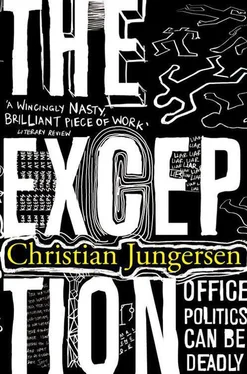Christian Jungersen - The Exception
Здесь есть возможность читать онлайн «Christian Jungersen - The Exception» весь текст электронной книги совершенно бесплатно (целиком полную версию без сокращений). В некоторых случаях можно слушать аудио, скачать через торрент в формате fb2 и присутствует краткое содержание. Год выпуска: 2010, Издательство: Orion Books, Жанр: Современная проза, Триллер, на английском языке. Описание произведения, (предисловие) а так же отзывы посетителей доступны на портале библиотеки ЛибКат.
- Название:The Exception
- Автор:
- Издательство:Orion Books
- Жанр:
- Год:2010
- ISBN:нет данных
- Рейтинг книги:3 / 5. Голосов: 1
-
Избранное:Добавить в избранное
- Отзывы:
-
Ваша оценка:
- 60
- 1
- 2
- 3
- 4
- 5
The Exception: краткое содержание, описание и аннотация
Предлагаем к чтению аннотацию, описание, краткое содержание или предисловие (зависит от того, что написал сам автор книги «The Exception»). Если вы не нашли необходимую информацию о книге — напишите в комментариях, мы постараемся отыскать её.
The Exception — читать онлайн бесплатно полную книгу (весь текст) целиком
Ниже представлен текст книги, разбитый по страницам. Система сохранения места последней прочитанной страницы, позволяет с удобством читать онлайн бесплатно книгу «The Exception», без необходимости каждый раз заново искать на чём Вы остановились. Поставьте закладку, и сможете в любой момент перейти на страницу, на которой закончили чтение.
Интервал:
Закладка:
She wipes her mouth with the back of her glove and cleans off the vomit. She is still leaning against the board. She remembers that after the evening in the office she had a headache cycling home.
I was sick then. Like now. When I rode along St Kjeld Street I kept telling myself: ‘I’m not like that. I didn’t do that.’ Nevertheless I recalled what it was that I had done. But by the time I had turned into Jagt Street it had become very distant, like hearing about it late one night at a party. Once I reached Tagens Road and home, I had even stopped saying, ‘I didn’t do that.’
Her ability to think is gone. She wants to lie down, but can’t do that on the pavement. The next-best thing would be to sit on a bench for a while or maybe go into a shop to rest, but that’s out of the question too. She feels safer from Jelisic while she’s on the move. Now she has to hurry, or he’ll find her.
I had such a sense of writing the truth. It felt so right: ‘You, Malene Jensen, have sworn to your secret evil …’And then: ‘You, Iben Højgaard, are for your actions recognised as self-righteous among the humans.’
She strides along, her muscles seeming stronger now that she has thrown up.
Outside Nørrebro Station she stops. Now where should she go? She’d like to go to Gunnar’s flat. He knows about danger. He’ll know what she should do to protect herself from Jelisic. But he mustn’t see her this way. At least she has the presence of mind to see that.
The other thing she’d like to do is go to Malene’s and tell her how sorry she is. It’s a good thought, even though she can’t imagine that Malene will ever forgive her.
It has become dark. Lights in shops and cars make a shifting pattern around her. She needs to tire out her brain, dampen down her emotions. Other people might take tranquillisers or splash cold water on their faces, but she gets the same kind of effect from working intensely. She must concentrate now to distract herself from all these emotions.
She will formulate an entire article in her head, leaving no room for any other thought. Later, all she’ll have to do is write it down.
The Psychology of Evil XXII
Here, the previous articles in Genocide News are followed up with an account of processes, uncovered by social psychologists, that allow perpetrators to reach the stage where they are capable of carrying out one murder after another .
By Iben Højgaard
The social psychologist Albert Bandura recruited a group of students to help him with ‘an experimental study of learning’ that also involved a group of students from another university …
She thinks about Omoro in that hut in Kenya.
I’ll never have a chance to ask him to forgive me. He died because I hesitated. And I hesitated because I saw an advantage for myself in holding back. He is dead now.
She tries once more:
The Psychology of Evil XXII
Here, the previous articles in Genocide News are followed up with an account of processes, uncovered by social psychologists … Two young women step out from a clothes boutique. Their aura of evil smells of pickled gherkins and rotten fish.
Iben’s concentration is going. She leans against a wall and tries to take up the thread.
The social psychologist Albert Bandura recruited …
His ‘helpers’ were to assist him in an experiment by administering electric shocks to members of the other group when they didn’t do well enough in tests. Just as they were ready to start, the helper group ‘accidentally’ overheard a senior assistant speak about the ‘pupils’.
I know why everybody praised me, she thinks: because I ran back to the policemen from Nairobi and tried to make them help the hostages. The press, as well as my friends, kept going on about how I put my life on the line to save the others. It’s because they need to hear such things — to be reassured that goodness exists. They dream of it. They watch it on television. But it’s all a lie! Those few seconds only proved that I couldn’t conceive of the possibility that the police would beat up or kill a white woman. I believed I was in no danger. My whiteness made me invulnerable, or so I thought.
She recognises the front door to Malene’s stairs. She must ask her forgiveness. Forgiveness would be such a relief. Or maybe it wouldn’t?
Malene doesn’t reply to the entry phone, so Iben uses her key to get in and goes upstairs to knock on Malene’s door.
Nobody answers. She could let herself in, but she doesn’t. She knocks again.
On her way downstairs she can’t see the large stained-glass patterns, because it’s too dark outside. A pane of clear glass has been fitted in Rasmus’s window.
She must pull herself together. Think of nothing but her article.
The Psychology of Evil XXII
Here, the previous articles in Genocide News are followed up …
The social psychologist Albert Bandura recruited a group of students to help him with ‘an experimental study of learning’ … We are rats, all of us.
Regardless of what has been written in the magazine previously. We’re simply
Regardless of what has been written in the magazine previously we may
Regardless, it must be admitted that I’m sick now. So dreadfully sick I cannot think any more.
Iben, concentrate!
The Psychology of Evil XXII
Here, the previous articles …
The many lies presented in our magazine are … The truth is … We are also in each other’s heads. Murder each other, when no one is looking. The self-righteous theories previously described in Genocide News are …
Iben cannot walk now. She sits down on a litter bin at a bus stop. She’ll have to throw up again soon. It’s all these people that do it — their smells: fried food, piss, chlorine; decay. She’s disappearing. It’s so hard to stay in control. Only work to hold onto, and logical thought.
The Psychology of Evil XXII
Here, the previous articles in Genocide News will carry on, sickly as ever, and … unable to think any more. The reason is that we’re all rats and ready to bite each other’s heads off .
I will stay sitting here despite the human rats that smell … on top of a litter bin at a bus stop … and on behalf of the Danish Centre for Genocide Information … evil under my nails, making them smell badly, and inside … the early wrinkles in my face. In my cells, in my DNA. In me.
I give up.
Two people in love are waiting for the bus. They don’t look my way. They wear the same kind of long coat in a colour like butterscotch and aren’t interested in the slightest in a confused woman sitting on a litter bin.
Now a teenage girl comes along to wait. She has painted names of bands and singers all over her rucksack, just as I did in my teens. She is about the same age as a lot of Cambodia’s Khmer Rouge soldiery. I know what she could do to that couple.
What about the lovers? They look so innocent. ‘Waiting for the bus’, that’s all.
But close-up you see the fat is oozing out of their pores — long, whitish-yellow worms. Those two, their bad smell won’t go away, even though they probably wash every day. It should not have been like this. Never.
I shouldn’t have fallen ill again. I should’ve been with Gunnar, in his kitchen, pottering about with the bread and little dishes for a delicious Sunday lunch. He would come and stand close behind me and hold me tight while he kisses my neck. And his two daughters, who are mine too, would be running about, in and out of the kitchen.
I know this scene so well. That’s how it should have been. And we would have been so happy. We wouldn’t have killed anyone then, not he nor I. Neither of us would have suffered from paranoia or been sick in the head.
Читать дальшеИнтервал:
Закладка:
Похожие книги на «The Exception»
Представляем Вашему вниманию похожие книги на «The Exception» списком для выбора. Мы отобрали схожую по названию и смыслу литературу в надежде предоставить читателям больше вариантов отыскать новые, интересные, ещё непрочитанные произведения.
Обсуждение, отзывы о книге «The Exception» и просто собственные мнения читателей. Оставьте ваши комментарии, напишите, что Вы думаете о произведении, его смысле или главных героях. Укажите что конкретно понравилось, а что нет, и почему Вы так считаете.












